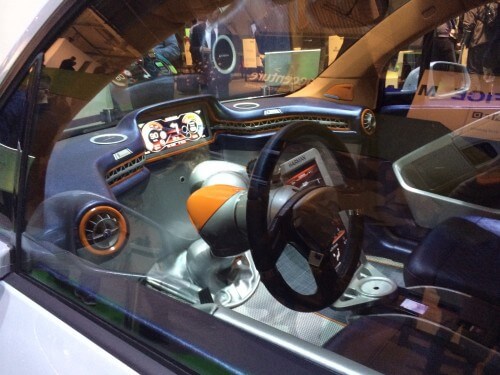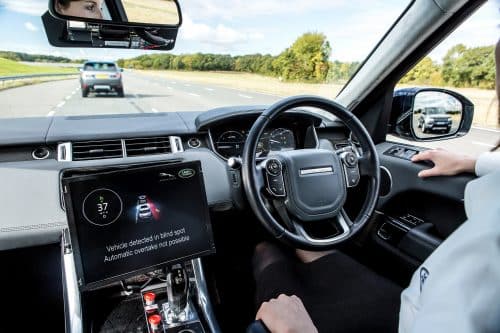This is what Dr. Shay Sofer, the chief scientist of the Ministry of Transportation said at the e-GOV government computing conference - this is a revolution that will ease the congestion on the roads and the parking shortage, and will even make transportation accessible to many marginalized populations - children, the disabled, the elderly and the blind

"The autonomous vehicle will change the face of the roads, because it is a revolution. It contains several layers: autonomous driving, connectivity, collaborative economy and propulsion methods - mainly the transition from a fuel-powered vehicle to an electric vehicle, and hydrogen propulsion is also being tested. It will also help solve the problems of road congestion and parking," said Dr. Shai Sofer, the chief scientist of the Ministry of Transportation.
Dr. Sofer spoke at the World e-GOV Forum 2018 conference, which took place recently at the LAGO event hall in Rishon Lezion, produced by People and Computers. He noted that "another important aspect of the autonomous vehicle revolution is the transition from ownership to service. We use the private car between 3% and 4% of the time, while the rest of the time it occupies a parking space. The ability to order an autonomous-electric vehicle, which will serve us for the specific period of time when we need a car, will help solve the parking crisis. This revolution will also make the car accessible to many marginalized populations - children, the disabled, the elderly and the blind."
He also talked about the communication aspect between the autonomous cars and themselves, and between them and the road infrastructure. "We recently received a bandwidth of 200 MHz in the 5.9 GHz range from the Ministry of Communications. Such communication will make it possible to avoid mistakes and accidents, will lead to energy efficiency and will enable effective traffic control," he said.
However, until the full realization of the autonomous vehicle, or even a significant part of the revolution, there is still a long way to go. "Today, most autonomous cars are level 2 on a scale of 1 to 5, where 1 is a manual car and 5 is a fully autonomous vehicle," said Dr. Sofer. "Class 2 vehicles know how to accelerate and brake on their own, and calculate the distance between them and other objects on the road by themselves. Mercedes, Audi and BMW are about to launch Level 3 models, which will allow adaptive cruise control, autonomous transition between lanes, hands off the steering wheel, maintaining the center of the lane, complete stopping in case the driver does not respond, and restoring autonomous capability after disobedience."

He said that the Ministry of Transportation is looking at things that are being done in the field of autonomous vehicles in other countries in the world, and have established test sites for such vehicles in Israel. "As part of the national plan for smart transportation, we have established 18 test areas for autonomous vehicles and our goal is to make Israel one of the biggest fathers in the world, so that the car companies will want to come and conduct experiments here," he added. Among those sites, Dr. Sofer mentioned the section of the Ayalon lanes from Kfar Shmariahu to Herzliya, which was recently opened to the traffic of "regular" cars, but during its construction it was used to test autonomous convoys. "We also have simulators, a cyber center and systems for physical travel," he said.
"The sites can be used for any experiment in the field of smart transportation - traffic lights, sensors, vehicle-to-vehicle communication and between vehicle and infrastructure, integration between systems, fusion of sensors and vehicle platforms. Any company that wants can contact the project managers at Ayalon Routes, which is our execution arm, and perform any experiment in the field. Our goal is to carry out between 120 and 150 significant experiments next year, and to work closely with the companies and startups in the field," he added.
More of the topic in Hayadan:

5 תגובות
All the companies that produce radars for semi-autonomous and autonomous vehicles act like "microwaves" on the roads and in addition develop for themselves dedicated processors that greatly increase the development budgets and are therefore expected to disappear in the near future.
The companies that went for a solution with the help of cameras are the ones that will lead the market in the near and distant future.
Most of the market currently works with one camera (Mobilay, etc.), one that knows how to identify very specific targets and dangers on the road. Not everything is built to detect and there are a lot of false alerts. They are not able to operate effectively in any weather such as heavy fog, total darkness, snow, blinders, etc.
The future belongs to companies that have learned how to develop products that use 2 and 4 different cameras (a combination of visible light cameras with infrared cameras), built to work in any weather and identify any object in XNUMXD (which, as you know, with one camera it is impossible to create a XNUMXD image) .
A company such as Foresight, which participated in CES for the past two years and was even awarded the innovation award in the automotive category this year, and many other good companies are the ones who will lead the market. What's more, they integrate into their products processors that exist in the market, in order to process the image received from the cameras into XNUMXD.
It is not clear how a service vehicle will reduce the congestion on the roads, since the congestion is caused by many people having to get to work/home at the same time.
It seems to me that until this is resolved, many cars will still be required and a kosher car will not be such a cheap thing.
There is a great deal of discussion about visions and plans, the timetable for their implementation, if and how long it will be - is in the long term. I have nothing against such discourse, on the contrary. The problem is that this discourse is not accompanied by the implementation of required plans for the near and medium term, when the situation is getting worse every day.
I will tell an unfortunate anecdote in connection with this:
About 7 years ago, as an entrepreneur and a lawyer, I proposed to the scientist of the Ministry of Transportation (also at that time, Dr. Shai Sofer) and the scientist of the Safety Institute a project to monitor abnormal driving patterns of at-risk populations (young drivers, truck drivers, recidivist drivers with an abnormal record of offenses, etc.), which was based on a "smart box" that is activated while driving the vehicle, with connectivity to a computerized control center and alerts the driver in real time. According to experts' estimates, it could have reduced the rate of fatal accidents by dozens of percent. The plan was also offered to the Israel Police (MDF). It was accompanied, in addition to the technological envelope, by a proper legal envelope as well.
I was amazed to see that none of the parties who should have jumped on the bargain - did not take the time to review it, and in fact barely agreed to meet and review the project plan. At the same time - the systems preferred to promote and implement outdated and ineffective ideas and systems such as standard policing, speed cameras, etc. Due to the lack of interest or indifference, in the end I gave up on the project, feeling that irrelevant and even extraneous considerations are playing in the system.
I should point out that, contrary to the attitude of the state system, the company Mobileye - which at the time developed another system based on a smart box - was indeed interested and found the program good (as Prof. Shashu told me at the time - Mobileye did not take it since its goal was to create for the private market and not for state systems) .
I wonder how many more useful plans for the immediate and medium term are rejected by the state systems in favor of failed plans or long-term plans, for reasons that are, at best, unprofessional.
in other countries of the world??
Meet another new religion - the "autonomous vehicle". A worthy competitor to the "solar energy" religion
1. Regarding the period of time that will be relevant. I estimate far above the predictions. Mainly because it is a very expensive technology.
2. The great advantage of an autonomous vehicle is in reducing accidents. And this is a huge and significant advantage.
3. An autonomous vehicle will not reduce the load on the roads, on the contrary. Families who can afford it will own several autonomous vehicles at the same time. For mother, father and each child.
4. People will not give up private ownership so easily. Those who can afford it will avoid using public vehicles (dirty, worn, and rare during peak hours)
5. There are already vehicles on demand - they are called taxis. Most people of course prefer private cars.
Too many wishes for a better world.